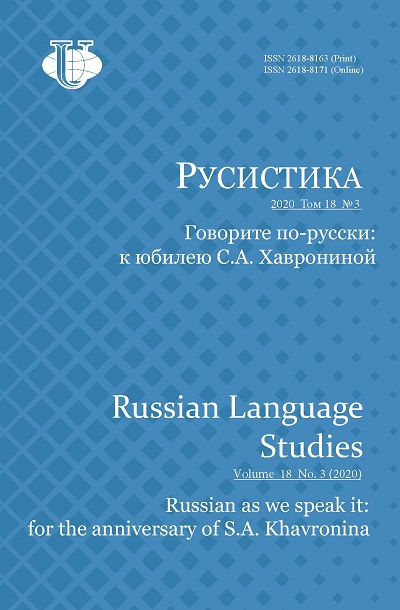Virtual reality as a tech tool for students studying Russian in China
- Authors: Qiu X.1
-
Affiliations:
- Sichuan University
- Issue: Vol 18, No 3 (2020): RUSSIAN AS WE SPEAK IT: FOR THE ANNIVERSARY OF S.A. KHAVRONINA
- Pages: 328-341
- Section: Methods of teaching russian as a foreign language
- URL: https://journals.rudn.ru/russian-language-studies/article/view/24500
- DOI: https://doi.org/10.22363/2618-8163-2020-18-3-328-341
- ID: 24500
Cite item
Full Text
Abstract
The article analyses the experience of implementing virtual reality (VR) in foreign language teaching, particularly teaching the Russian language in Chinese universities. Basing on different approaches and the results of applying VR in practical classes at the Russian Language Faculty of Sichuan University, the research on the effectiveness of VR technologies has been done in terms of stimulating Russian language learners’ motivation, enhancing their knowledge, strengthening their language capability, developing basic oral Russian, as well as improving the quality of teaching Russian in a non-native environment. The research subject is determined by the transformation of the educational process among students with a relatively good language capability. The novelty and actuality of the topic are due to the following factors. Firstly, it is modelling situations with real-world samples when the organizer of educational process makes it immersive by using computer and recordings. Secondly, auto-reading module can be used. Thirdly, the system can check the consistency between the original text and the one recognized by voice recognition module. The author reviews indicators of the experiment, aimed at assessing teaching results and summarizing the changes in knowledge acquiring with using VR technologies at the Russian Language Faculty of Sichuan University. According to the results of the survey, the author studies the pros and cons of the changes brought by VR and concludes the opinions of the tested students and teachers participating in the experiment. The results of the experiment illustrate changing roles of teachers and students. To be specific, the teacher is no longer a simple organizer, but a supervisor, assistant and consultant, playing a supporting role. Students gradually master the functions of training systems. It stimulates them to work independently under VR. This has been proved by the students’ results in the semester exam and the state accreditation test of translators. Besides, the statistical data are presented on the differences between the traditional model of language teaching and the one under VR.
About the authors
Xin Qiu
Sichuan University
Author for correspondence.
Email: qiuxin12121@163.com
Ph.D in Philological Sciences, Dean of the Russian Language Faculty
29 Wangjianglust St, Chengdu, 610000, The People’s Republic of ChinaReferences
- Bao, X. (2006). A review of A. Bandura’s social learning theory. Cultural and educational materials, (3), 78-79. (In Chinese.)
- Burdea, G., & Coiffet, P. (2003). Virtual Reality Technology. Presence: Teleoperators and virtual environments, (6), 663-664
- Davies, P., & Pearse, E. (2000). Success in English Teaching. London: Oxford University Press
- Gavrilova, Y. (2009). Osnovnye obshelingvisticheskiye vzglyady Dzh. R. Fersa [The main general linguistic views of J.R. Firth]. Bulletin of the Moscow State Regional University. Series: Linguistics, (2), 24-28. (In Russ.)
- Giuseppe, R. (2007). Affective Interactions Using Virtual Reality: The Link between Presence and Emotions. CyberPsychology& Behavior, (1), 45-56.
- Guri-Rosenblit, S. (2009). Distance Education in the Digital Age: Common Misconceptions and Challenging Tasks. Journal of Distance Education, (2), 105-122.
- Halliday, M.A.K. (1964). The Linguistic Sciences and Language Teaching. London: Longman Publ.
- Halliday, M.A.K. (1989). Language, Context and Text: Aspects of Language in a Social-Semiotic. London: Oxford University Press
- Hoffman, H. (1997). Virtual Reality: Teaching Tool of the Twenty-First Century? Academic Medicine: Journal of the Association of American Medical Colleges, (12), 1076-1081
- Hu, Z. (1994). Discourse Cohesion and Coherence. Shanghai Foreign Language Education Press. (In Chinese.)
- Mazur, E. (1997). Peer Instruction: A User’s Manual. Upper Saddle River, NJ: Prentice Hall Publ
- Sergeev, S. (2008). Konstruktivizm: Kontsept “Znanie” [Constructivism: The concept “knowledge”]. Filosofia obrazovaniya [Philosophy of Education], (1), 286-294. (In Russ.)
- Shao, N. (2016). Visual-Audio-Oral Russian Course Based on 3D Virtual Reality. Journal of Guizhou Normal University, (8), 85-89. (In Chinese.)
- Sherman, W., & Craig, A. (2018). Understanding Virtual Reality: Interface, Application, and Design. Morgan Kaufmann Publ
- Tugova, Y.А. (2019). Metodika formirovaniya lingvokul'turnoi kompetentsii inostrannykh studentov tekhnicheskogo profilya s ispol'zovaniem audiovizual'nykh tekhnologii [Methods of Formation of Linguistic-Cultural Competence of Foreign Students of a Technical Profile with the Use of Audiovisual Technologies]. International scientific and practical conference of young scientists: The study and teaching of Russian language in different linguistic and cultural environments. Moscow: RUDN University Publ. (In Russ.)
- Wang, C. (2006). Foreign Language Listening, Speaking, Reading and Writing from the Perspective of the Compensation Hypothesis. Foreign Language Research, (1), 79-84. (In Chinese.)
- Wang, C. (2018). Take Embodied Cognitive Theory to the Ground: Situational Interaction Supported by Technology. e-Education Research, (7), 20-26. (In Chinese)
- Zarayskii, A. (1996). Problema znacheniya v zarubezhnom yazykoznanii [The problem of significance in foreign linguistics]. Saratov: Saratov University Publ. (In Russ.)
Supplementary files














